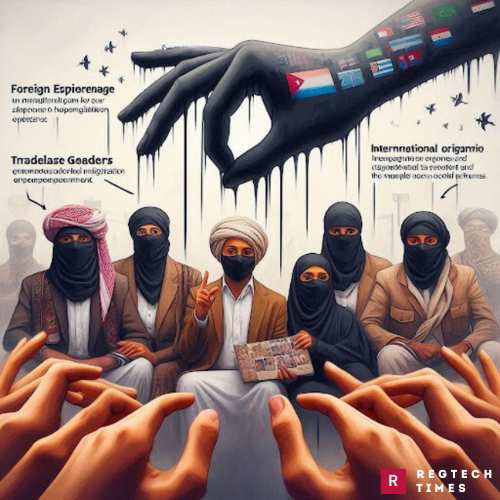Yemeni security forces uncovered an extensive espionage network allegedly operated by Israeli and American intelligence agencies. This network, according to confessions obtained by the authorities, was engaged in a concerted effort to infiltrate and corrupt various sectors of Yemeni society, particularly targeting the youth, women, tribes, and marginalized groups. The revelations have sent shockwaves through the nation, highlighting the intricate methods used to destabilize Yemen from within.
Corruption Through Youth Recruitment and Social Manipulation
The network’s modus operandi, as revealed in the confessions, involved attracting young leaders in Yemen and recruiting them to provide information to the CIA. This strategic move aimed to shape the minds of the future generation while disseminating Western ideas and values that conflict with traditional Yemeni culture. The ultimate goal was to ensure the influence of selected social figures and place them in key positions within the directorates, thereby exerting significant control over the societal structure.
Targeting Women Under the Guise of Empowerment
One of the most striking targets of this espionage operation was women. Programs were promoted under the banner of empowering women in Yemen, ostensibly to establish equality between genders. However, these initiatives had the hidden agenda of recruiting women to gather intelligence for the United States. The gathered intelligence was purportedly used to corrupt the societal and familial structures, thereby weakening the traditional foundations of Yemeni society.
Infiltration of Tribal Structures and Religious Leaders
The espionage network also focused on Yemen’s tribal systems, which play a crucial role in the country’s social fabric. Several programs were established to gather detailed information about tribal structures, with a particular focus on recruiting and polarizing religious men and clerics. This effort aimed at creating divisions within the tribes and undermining the authority of traditional leaders, thereby fostering instability and conflict within these communities.
Manipulating Civil Society and Marginalized Groups
Another significant revelation was the network’s infiltration of civil society establishment communities, local councils, minorities, and marginalized groups such as the Bohra and Makarim. By claiming to defend and support their rights, the network aimed to interfere in Yemen’s internal affairs and disrupt societal stability. The confessions detailed how a global community project was used to attract social figures, creating influence for American intelligence under the pretense of social support and rights advocacy.
Projects and Organizations Involved
The investigation highlighted several projects and organizations involved in this covert operation. Among them were:
Mercy Corps: Implemented a project titled “Building Youth Capacities in Conflict Resolution,” which ostensibly aimed at training young people in conflict resolution techniques but was allegedly part of the broader espionage strategy.
AMIDEAST: Conducted the “Leaders Network for Development,” implemented by the Yemeni “Renin” Organization. This project focused on developing leadership skills among the youth but was reportedly used to recruit individuals for intelligence purposes.
US Agency for International Development (USAID): Involved in various projects aimed at development and conflict resolution in Yemen, these initiatives were allegedly exploited to gather information and influence local communities.
Reactions and Implications
The revelation of this espionage network has sparked widespread outrage and concern among Yemeni citizens and officials. The detailed confessions have highlighted the depth of foreign interference in Yemen’s internal affairs, raising questions about the true intentions behind international aid and development projects.
Local authorities have vowed to take stringent measures to safeguard the nation’s social fabric and prevent further infiltration by foreign intelligence agencies. There is also a growing call for greater transparency and scrutiny of international organizations operating within Yemen to ensure that their activities align with the country’s interests and do not serve hidden agendas.
The exposure of the Israeli-American espionage network in Yemen highlights the complex and covert methods employed to influence and destabilize societies. By targeting the youth, women, tribes, and marginalized groups, the network sought to undermine traditional structures and create divisions within Yemeni society. As the nation grapples with these revelations, there is an urgent need for vigilance and resilience to protect its social and cultural integrity from external manipulation.



